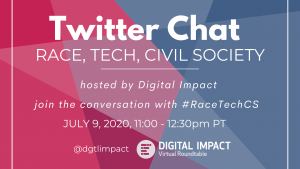event
[Virtual Event] #RaceTechCS Twitter Chat

July 9th, 2020 - 11:00 am to 12:30 pm
Tweet @dgtlimpact with #RaceTechCS
How are technologies being used to surveil BIPOC communities and what are the ways to organize against this surveillance? Why should people impacted by technology have a voice in how that tech is regulated and employed? What happens to civic participation when BIPOC people are targeted with misinformation?
Following the first two events in our Race, Tech & Civil Society series, Digital Impact will host a Twitter chat to explore these and other questions curated by the community. Join the conversation with #RaceTechCS on July 9th at 11am PT, respond to questions in real time, and see what others are saying.
We now depend on digital communications for nearly every aspect of our daily lives. As our dependencies on digital technologies increase, so do disparities in equity — especially for Black, Brown, and Indigenous people. These communities are leading responses to these inequities, building on their collective wisdom and trusted relationships, and welcoming new allies in this fight.
Join us on July 9th for this special event on Twitter @dgtlimpact and join the conversation with #RaceTechCS.
A note on content
We are committed to a robust and free academic discourse. However, this means some topics in this discussion may be uncomfortable or disturbing to some members of the audience. If this is the case for you, we invite you to view the Twitter thread afterward or join a different event in the future.
Our community standards
Stanford PACS strives to provide rigorous academic discussions and a welcoming environment for all speakers and attendees. Please note that we will not tolerate any individuals who attempt to disrupt the conversation, use inappropriate language, or harass other participants and speakers. We reserve the right to remove any individuals engaging in such behavior from this event.
Race, Tech, and Civil Society Event Series
The global pandemic gives new urgency to conversations about race, technology, and civil society. As we depend on digital communications for every aspect of our daily lives, who is left behind? How are technologies being used to surveil communities of color – and how do communities respond to such surveillance? Why is it critical for people impacted by technology to have a voice in how that technology is regulated and employed by governments?
Join us for conversations with scholars, practitioners, activists, and policy experts to explore these issues. Learn more about the rest of the series.
